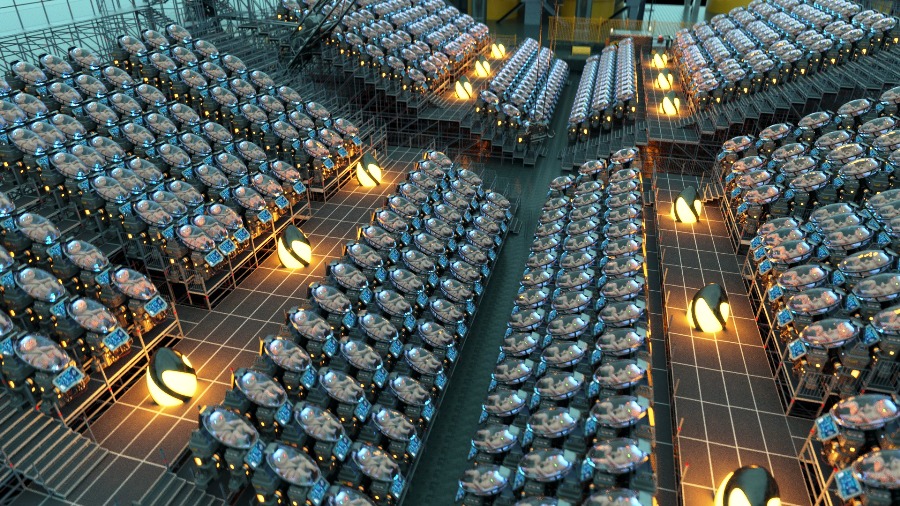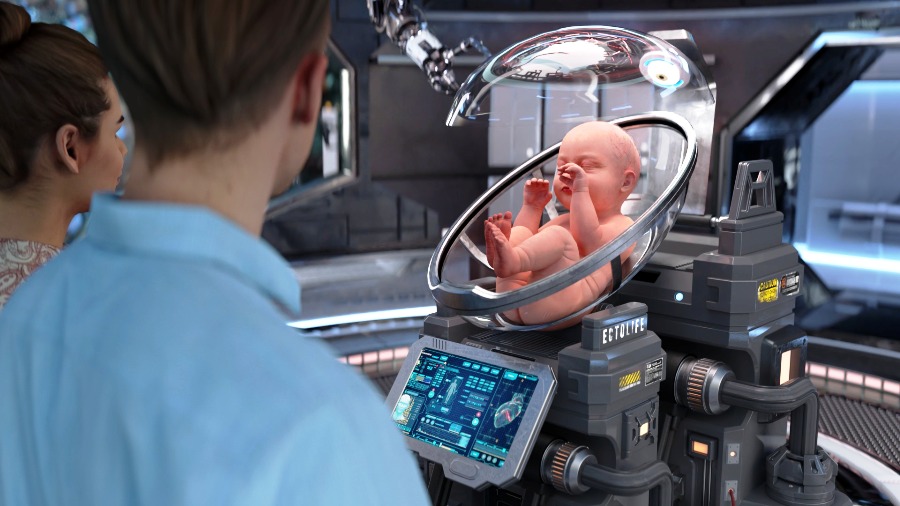SRINAGAR: Seemingly a plot out of Hollywood science fiction, the so-called baby factory idea has triggered a fierce ethical debate on science across the world. Conceived by Yemen-born science content creator, Hashem Al-Ghaili, the concept revolves around the idea of mass-producing babies in artificial wombs in perfect laboratory conditions for infertile couples or those unwilling to conceive for one or other reason. He operates from Berlin.

Named EctoLife, the concept is a quantum jump to a 2017 idea in which scientists created a BioBag that worked as an artificial womb for growing eight baby lambs. In 2012, Israeli scientists produced mice in a similar bag that reduced the gestation from 22 to 11 days.
The concept envisages high-tech pregnancy in which the baby grows in an “idealized but completely inhuman environment” “growth pods”. The only normality in this “baby boom” is the mixing of sperm and egg in a Petri dish and then science takes over. In the design about which al-Ghaili released a high-definition video, an artificial umbilical cord provides oxygen and nutrition to the pod-stationed baby as the tot floats in artificial amniotic fluid, continually refreshed with precisely tailored hormones, antibodies and growth factors. The pod waste is drained through a bioreactor and enzymatically converted back into “a steady and sustainable supply of fresh nutrients.”
For all nine months, the parents will be able to check and actually monitor the vital signs of the baby from their smartphones.
Showcasing his idea to Science and Stuff, Ghaili said his idea would finally be able to meet the needs of parents who are “tired of waiting for a response from an adoption agency” and those who are “worried about pregnancy complications.”
In order to buttress his claim, he refers to the World Health Organization (WHO) data suggesting that 15 per cent of reproductive-aged couples worldwide are affected by infertility. The world is living in an era in which fertility is taking a toss. From a fall in sperm count to an increase in women’s participation in economic activity, a varied set of reasons are being held responsible for the fertility fall. There are 23 countries suffering from seriously low growth rates.
The concept will do away with the crisis of miscarriages, death of mothers (usually three lakh a year) during pregnancy, and imbalanced nutrition intake of the foetus and can even take care of genetically inherited diseases.
The EctoLife concept is a mass upgrade of already prevalent in-vitro fertilisation (IVF) that involves the most advanced technologies including artificial intelligence to monitor baby development. The world’s first two ‘test tube’ babies are sisters and they are already mothers. Now around 80 lakh babies are born through IVF every year.
Assistive reproduction technology (ART) is already a huge business across the world. Estimates put this sector at around US $ 20 billion a year.
It is, however, Ghaili’s design that is hugely impressive. It starts with IVF to produce a viable embryo. It will be at the basic stage that the egg and sperm can be screened for birth defects so that the “genetically superior embryos” do not get miscarried in the process. The parents can have the right to genetically engineer their embryo using the Crispr-Cas9 gene-editing technology to edit out diseased inheritance. This is what designer baby is all about.
Once ready, the embryo gets in the artificial womb, called the pad where the AI controls the baby’s nourishment and reports to the manager and parents about the progress. It will be filled with filled a special type of amniotic fluid. The parents will have access to their babies round the clock through a smartphone app and virtual reality (VR) and they can communicate with them so that they are accustomed to their speech while in the “womb”. They can use speakers to sing to their babies. Once the AI reports the maturity of the baby, simply a push button will give birth to the baby. Before taking the baby home, they can go for a DNA check to ensure the paternity so goes the design.

The babies will be fed from a central pool of nutritious fluid that will be monitored and permitted by the AI managing the pod. All the wastage that the baby may produce in the latter weeks will move out and reprocess as nutritious in the “factory” that will work with renewable energy. The concept has two centrally located tanks with one pumping nutrients and another obtaining waste from the incubators and reprocessing it. The technology will see a stage where families can rent a pod and take it home too.
Al-Ghaili has told in his interviews that barring the “womb” all the associated technologies that he has used in the concept are not only scandalised but are already in use. “It’s just about combining all this research work into a single invention, which is what my new concept does,” Al-Ghaili has said.
The concept has triggered a fierce debate. It is being termed a “dystopian” baby gestation factory. A huge section of the scientists, however, say most ingredients of the concept are already in vogue, albeit differently.
It is being seen as a new model of parenthood in which the existing technology aids in the growth of the foetus in a perfect human being. Some scholars who have jumped into the ring suggest that the technology – if ever developed, will help the human brain to achieve the size it requires. A general belief is that the human brain and skull is suffering in achieving the normal size because of “the constraints of the human uterus and pelvis” – the human female hip gap, an issue that the “pods” can manage better as it lacks any restriction.
Hashem, it may be recalled here, is an exceptional science communicator. Born in Yemen, he did secondary schooling in Peshawar in biology, graduated from Jacobs University Bremen and obtained his master’s degree in Molecular Biology from there. Though he choose to study further and enrolled himself on a PhD programme, he quit it preferring his science communication passion. He runs one of the world’s most powerful Science and Nature page on Facebook and many other social media platforms. In the last few years, he has produced and directed various fiction films that were well-received across the globe.















